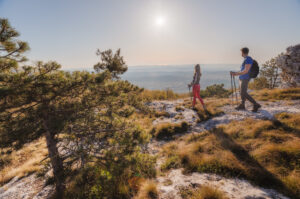Moving with family
Moving for work can be a difficult process, and having the support of a family can importantly ease the transition. Being able to rely on a family can provide a sense of stability, security and comfort during setting to a new destination. Additionally, having family with you can help you to settle into a new environment more quickly and make more easily new connections. Having a family to share experiences with can often make the move more enjoy.


RESIDENCE PERMIT FOR FAMILY MEMBERS
The methods and conditions of entry into the Republic of Slovenia differ depending on whether the person entering the country is a citizen of a Member State of the European Union, or a third-country national.
EU citizens and their family members
Citizens of the European Union do not need a visa or residence permit to enter the Republic of Slovenia. Entry is permitted on the basis of a valid identity card or a valid passport, irrespective of the reason for entering or the reason for residing in the country – employment, study, self-employment, relocation, etc.
An EU citizen is refused entry if:
- he or she does not hold valid identification documents,
- he or she is prohibited from entering the Republic of Slovenia,
- his or her residence in the Republic of Slovenia would pose a serious and actual threat to public order, security or public health.
For the first three months after entry, he or she may reside in Slovenia without residence registration. However, for a longer stay, EU citizens must obtain a residence registration certificate at the administrative unit in their area of residence before the expiry of the authorised three-month stay. EU citizens may also apply for a residence registration certificate immediately after entering the Republic of Slovenia.
The provisions of the Foreigners Act applying to EU citizens also apply to the citizens of the Member States of the European Economic Area and their family members.
Residence registration certificate for EU citizens
EU citizens who wish to reside in the Republic of Slovenia for a period longer than three months may apply for a residence registration certificate at the administrative unit in their area of residence immediately upon their entry into the country or before the expiry of the authorised three-month stay.
Purposes recognised for obtaining a residence registration certificate:
- employment or work, self-employment, provision of services, job search,
- study, vocational training or other forms of education,
- reunification with a family member who is a citizen of the European Union or of the Republic of Slovenia,
- other reasons, provided that the conditions for doing so are met.
Conditions for issuing a residence registration certificate:
- a valid identity card or passport,
- adequate health insurance,
- sufficient means of subsistence,
- if an EU citizen is applying based on employment/work/self-employment/provision of service, it shall be sufficient that they submit a confirmation from their employer that the EU citizen will be employed or proof that he or she is already employed or performing work or proof of self-employment or provision of service,
- if an EU citizen is applying as a job seeker, it shall be sufficient that they register with the competent employment authority as a person seeking employment,
- if an EU citizen is applying based on study/vocational training/education, he or she must submit – in addition to the first three requirements listed above – proof of admission to studies or training or other form of education,
- if an EU citizen is applying based on reunification with an EU-citizen family member, proof of family ties must be submitted in addition to the first three requirements listed above. If an EU citizen works, is self-employed or provides services in Slovenia, the requirements listed in indents two and three above do not apply.
The same rules apply to family members who are family members of Slovenian nationals.
The residence registration certificate is issued to EU citizens for the duration of their intended stay, or for a maximum period of five years. A residence registration certificate may be renewed under the same conditions as it was issued.
Non-EU, EEA or Swiss citizens, who have their family members abroad and would like to live with them in Slovenia:
You can immediately request for the unification of their family if you:
- Have a permit issued for the purpose of work in research and higher education;
- Hold a Blue card;
- Are a EU citizen (&EEA).
How can you get it?
File an application for a temporary residence permit for the purpose of family unification. Applicant is the person who is unifying his/her family.
Supply the following documents:
- Agreement or contract (pdf)
- Passport (valid at least 3 months longer than the intended stay)
- Passport copy – page with biographic data, page with entry stamp and visa
- Biometric colour photograph – 3,5 x 4,5cm + Annex 4 – signature
- Health insurance
- Health insurance, covering at least emergency medical services (for countries with which Slovenia has an agreement, you bring the proof from your home country’s health institute).
- Proof of sufficient financial means (currently EUR 465,34 per month per person) – options:
- Own funds of the family member (bank statement, employment contract, etc.);
- Statement that you will financially support your family members (form).
- Police clearance certificate from home country, not older than 3 months and with Apostille (or properly legalised, if your country does not issue Apostilles – exception: citizens of Bosnia and Herzegovina, North Macedonia, Serbia and Russia do not need to legalise document);
- Two fingerprints (taken at the administrative unit or the embassy);
- Proof of relationship status (marriage certificate, birth certificate, etc.) with Apostille (or properly legalised, if your country does not issue Apostilles – exception: citizens of Bosnia and Herzegovina, North Macedonia, Serbia and Russia do not need to legalise document).
All documents have to be translated into Slovene by a court-appointed translator!
How soon should you arrange it?
As soon as you receive your temporary residence permit.
Time needed
Up to six months in Koper, elsewhere less.
Cost
EUR 69.97 + documents and translations
Where?
At the Administrative Unit.
Be aware that you can ask for the residence permit at the Slovenian embassy, but not in other EU embassies. Check here to find the closest embassy and working time.
WHEN YOU PICK UP THE TEMPORARY RESIDENCE PERMIT, ALSO BRING THE DOCUMENTS NEEDED TO REGISTER A TEMPORARY ADDRESS:
- passport,
- permission card,
- lease agreement or owner consent.
If you apply for the permit at the embassy abroad, check the embassy’s webpage before launching an application. Contact your closest embassy to learn about the specific process at that embassy and schedule an interview if needed.
For detailed information click here.
SPOUSAL WORK
Your spouse will be entitled to live in Slovenia, but not to work. To be entitled to work, he/she should first find a job and then change for the permit in cooperation with the employer.
The spouse (if he/she is not employed) and children are insured trought the husband/wife (if he/she is employed in this case). It is necessary to file the MDČ form at ZZZS. It is also necessary to submit a certificate of registration at a temporary address, a statement that the person is not insured in another country and the child’s birth certificate, if it is a child, or not older than three months marriage certificate, if it is a wife.
KINDERGARTENS
There are public and private kindergartens in Koper / coast.
Public kindergartens
To secure a spot in a public kindergarten, you should apply sometimes in March for next year. After you submit the application, your family income would be checked and based on that, the partial subsidy would be set. Full kindergarten price is EUR 650 and if you would get the lowest subsidy, you would have to cover 90 % of the cost (so EUR 585).
Be aware that kindergartens in coastal municipalities are totally full and it could be difficult to secure a spot. Here is the link to the list of kindergartens.
Private kindergartens
There are some private kindergartens with concessions. If you choose one of these, you should also apply to the municipality, which offers subsidies, and then pay extra for the extra services, depending on the kindergarten.
All of the kindergartens also offer English in their programme:
Račka
– Catholic kindergarten;
– Vegetarian food;
– Link
Mehurčki
– Smaller groups;
– Pleasant;
– Can adapt the food;
– Positive feedbacks;
– Link
Hiša otrok obala
– Montessori kindergarten;
– Pescaterian lunches;
– Montessori approach, English and Italian languages offered;
– Link.
Other options:
Private childcare
– Smaller, maxium 6 kids per nanny;
– No subsidy offered;
– Different pricing.
Hiša otrok Mozaik
– Motessori childcare;
– It is a childcare, not a kindergarten;
– Generally should have some places available;
– Link.
Waldorf childcare
– In Žusterna;
– Mixed feedbacks;
– Link.
Marijin vrtec – Izola
– Montessori kindergarten run by nuns;
– In Izola;
– We do not have any direct feedback;
– Link.
SCHOOLS
All children aged 6 to 15 (+/- a year) in Slovenia visit elementary schools, which lasts for 9 years. Elementary school in your area has to accept your child. However, we recommend you try to enroll your child in a bigger school (Osnovna šola Koper), as they will have more resources and staff working on integration.
There are no international schools in Primorska. Closest international elementary schools are in Ljubljana (public school Danila Kumar International School and some private schools) and Trieste (The International School of Trieste).
As Primorska is officially a bilingual area, there are Slovene-speaking and Italian-speaking elementary- and high-schools.
Secondary education in Slovenia is divided in general education (gimnazija), vocational, and secondary technical education. General secondary education – gimnazija, lasts 4 years, and it ends with an external examination (matura). This “matura” grants students access to university and other post-secondary vocational and professional higher education programmes. Vocational and technical secondary education is meant to prepare students for a profession. This education last from 2 to 5 years. Education finishes with a final examination. Each year in February, the pre-enrolment announcements for secondary schools are published. Schools also organise Information Days in which students can get to know the programmes offered by a particular school. The application for enrollment in the secondary school needs to be submitted by the given date in March. If there are more applications than available vacant places, a school may limit enrollment.
